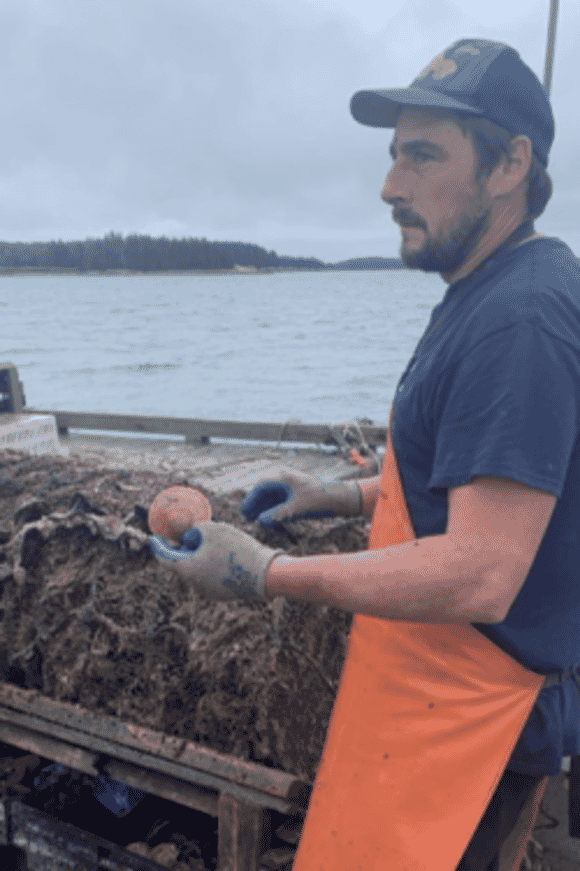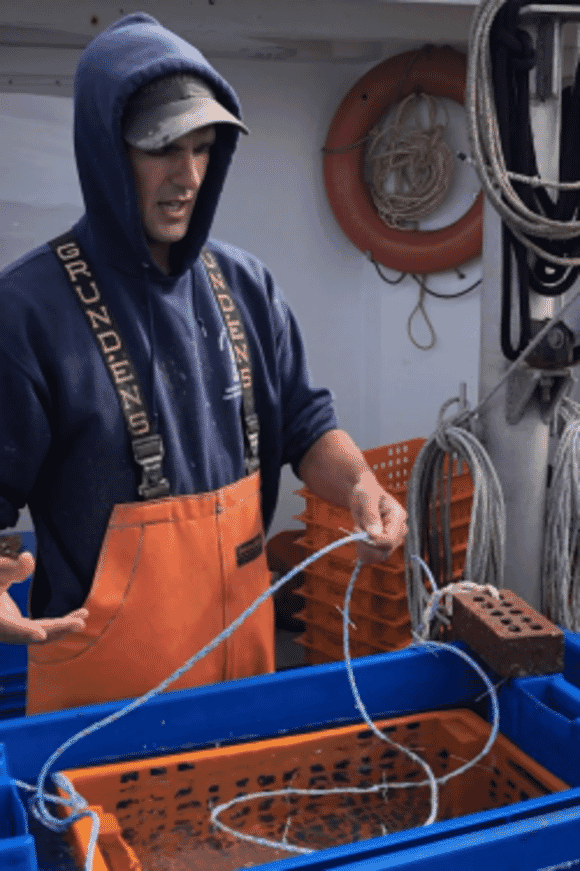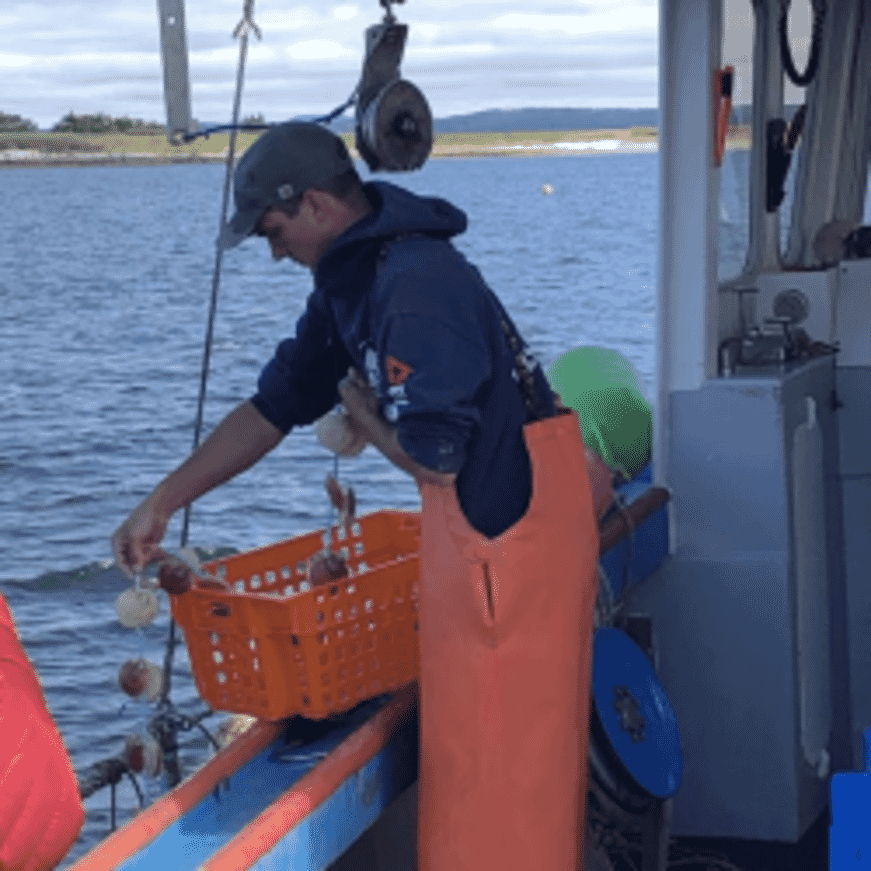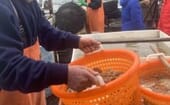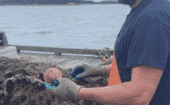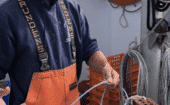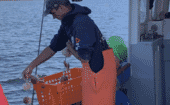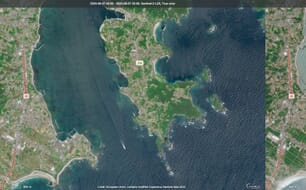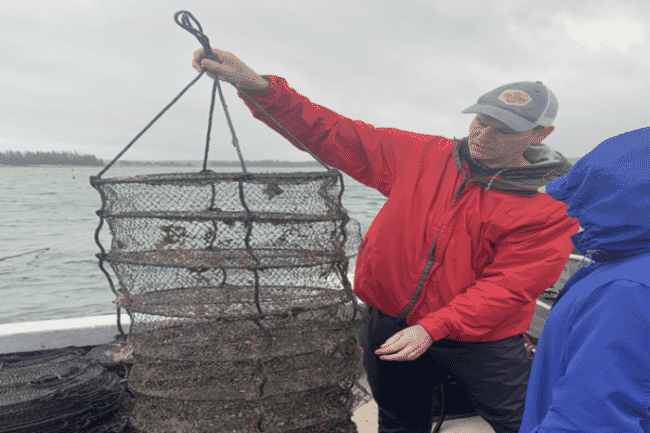
Cowperthwaite holds up a lantern net while describing the method of scallop farming with lantern nets hung vertically in the water © NOAA Fisheries
Maine’s fishermen are facing numerous threats from climate change and changing ecosystems, and aquaculture offers a solution. The state’s wild fisheries have become very focused on the lobster industry, but farming sea scallops gives an opportunity to diversify the seafood harvesting business and increase resiliency for coastal communities built around seafood production.
The scallop aquaculture community is unique to Maine and composed of a variety of people and organisations, including fishermen farmers, marine extension programmes, community development financial institutions and research and outreach foundations.
NOAA Fisheries and Coastal Enterprises, Inc recently visited with Marsden and Bob Brewer, operators of PenBay Farmed Scallops and Andrew Peters, co-owner of Vertical Bay Scallops. CEI is a community development financial institution in Maine that has a long history of supporting fishing and aquaculture. Both of these aquaculture farms are examples of opportunities for marine livelihoods that shellfish farming is providing in Maine.
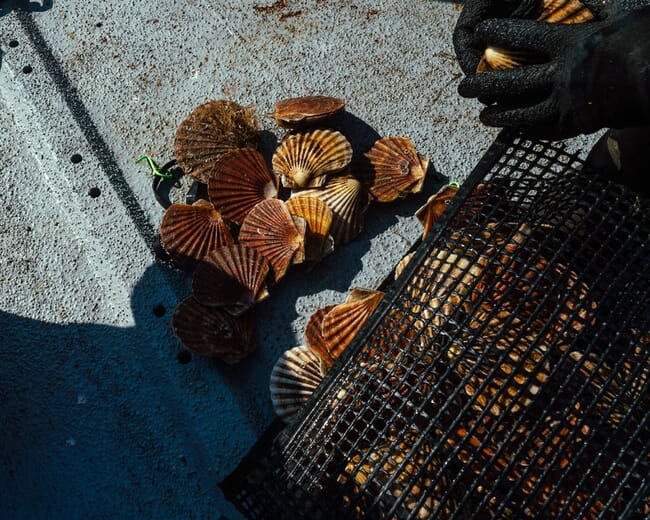
Maine's scallop industry includes a diverse subset of fishermen farmers, researchers, aquaculture extension officers and financial institutions © Erik Woolcott, Seagrown
Meet the farmers
Marsden Brewer is a fourth-generation fisherman who still fishes for lobster. However, reduced stocks and an increase in commercial fishing regulations have led to a decrease in fishing opportunities. Marsden’s son, Bob, wanted a career working on the ocean; Marsden looked for other opportunities and saw the potential in sea scallop farming.
Marsden said, “in order for a waterfront to stay alive, you gotta be having something to sell. You gotta be landing in product. You gotta bring new money into your community. And this does it, same as lobsters.” Together, Marsden and Bob created their company and have reached the point of making weekly deliveries throughout Maine coastal communities. They have plans to expand production to further meet existing demand.
Andrew Peters spent years as a sternman on commercial lobster vessels while planning to pursue a licence to fish lobsters on his own vessel. However, gaining a licence was uncertain and came with an extensive waiting period. This led Andrew to search for other ways to expand and solidify his marine career. He discovered new possibilities in scallop aquaculture.
-

Marsden Brewer rinses sea scallops to be ready for packaging and delivery within 24 hours of pulling them from the ocean. -
![]()
Bob Brewer shows a sea scallop as he clears off a lantern net just pulled from the ocean. -
![]()
Andrew Peters describes the “ear hanging” technique––holes are drilled into the “ears” of a scallop shell and attached to lines suspended vertically in the water column where they can filter feed. (“Ears” are extensions of shell, and do not serve a hearing function.) -
![]()
Andrew Peters adds a newly populated line of sea scallops onto the sea farm.
“A huge reason why we picked scallops to farm over other species was the amount of support from interested parties,” said Andrew. Since founding Vertical Bay farms in 2017 with his wife Samantha, they have expanded their knowledge of farming scallops, accompanied by increasing sales.
They have applied for additional authorisations from Maine to expand production. Andrew now sees a future where sea scallop farming is profitable and will allow him to work on the ocean full time.
Creating a unique aquaculture product
Sea scallop farming will serve a specialty market within the seafood industry, allowing consumers to buy scallops at different sizes, ranging from petite to jumbo. The buyer could even have the opportunity to purchase the whole animal instead of the more commonly available sea scallop adductor muscle meats.
Part of the interest in farmed scallops relates to the traceability of the product from farm to market. This is especially important because they are promoting the freshness that comes from distribution to markets within 24 hours of harvesting. PenBay Scallops created a cookbook to help consumers, chefs and wholesalers understand what the products are, where they come from and how to use them.
Maine’s scallop aquaculture industry will not compete with wild scallop harvesting volumes in New England. Neither will it impact the trends for demand and prices of wild harvested sea scallops due to the differences in harvest and distribution scales, market demands and production costs. “A farmed scallop is not meant to compete or displace wild fishery scallops. It’s simply a different product offering,” says Hugh Cowperthwaite, CEI senior programme director for fisheries and aquaculture.

